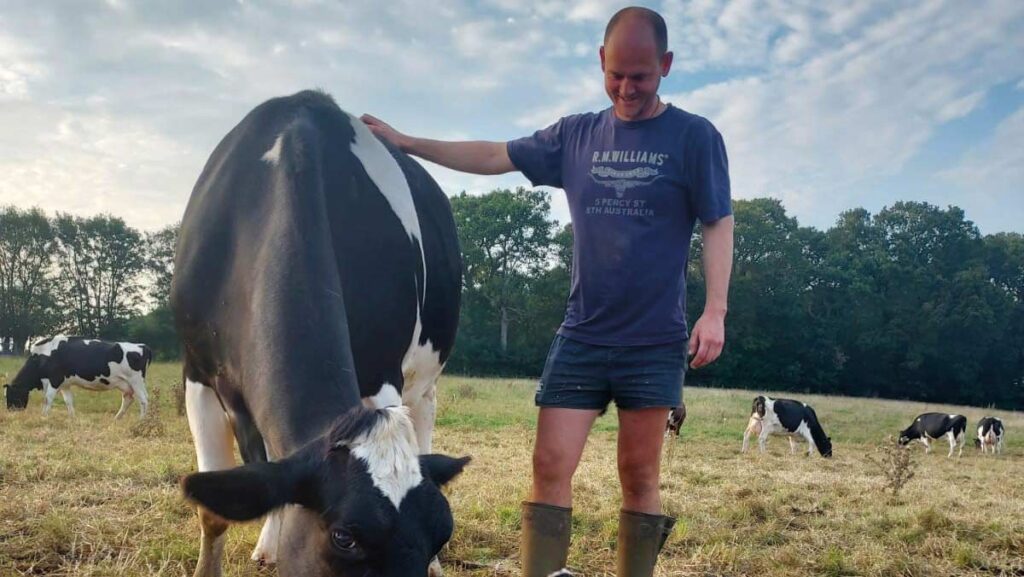Farming careers: From dairy herd manager to joint venture
 © Supplied by Matt Hill
© Supplied by Matt Hill Matt Hill, 33, has progressed from working as a unit manager on a dairy farm to being part of a joint venture milking 280 cows on a 255ha estate in Gloucestershire.
From a non-farming background, Matt grew up next to a dairy farm and started helping with the cows as a teenager.
Deciding to learn a trade, he studied cabinet-making as well as completing an agricultural qualification at Plumpton College, Sussex.
See also: Farming careers: Working as a sprayer operator
He then took some time to travel, spending a year in the US on a Worshipful Company of Farmers scholarship, several months in Australia driving big kit and working on a cattle station, and two years as a senior herd manager in New Zealand.
Back in the UK, Matt spent a few years as a unit manager in East Sussex, converting an arable estate to a dairy holding and starting the herd from scratch.
In December 2021, he saw his current role advertised as a 10-year contract farming agreement opportunity and applied, before starting in March.
The estate supplies the land, infrastructure and cows, while he provides the labour and experience. Matt also rents another 60-acre farm for his own sheep.
Matt has monthly meetings with the landowner and estate manager, and sends regular reports.
His time is spent planning, improving infrastructure, managing two full-time staff and relief workers, and covering the milking when necessary.
Herd manager job profile
What does the job involve?
Day-to-day management of the dairy herd and managing and leading a small team.
It involves an understanding and interest in computer programs related to milk recording, grass growth, fertility, and disease.
You need to have a detailed practical understanding of cattle husbandry, with skills in foot-trimming and artificial insemination.
Working as part of a team is critical and an interest in staff development encouraged.
It requires maintaining the standards necessary to meet milk contract stipulations, farm assurance and environmental regulations.
What qualifications/experience are needed?
A qualification from an agricultural college will be beneficial.
But a number of years of practical experience with cows is required and demonstrable experience of having sole responsibility for cow-related processes on farm.
What are the benefits of this job?
Working with animals, having a major influence in the success of a business, living and working in some of the most beautiful parts of the country, and job-specific benefits such as accommodation, vehicle and organisation memberships.
What would a typical salary be?
£30,000-£45,000, dependent on responsibilities or other benefits like accommodation, vehicle, performance bonus or potential profit share options.
How can you progress from this role?
Progression could lead to share farming agreements, growth of an existing business (including diversification), new roles with more responsibility in larger herds or herds with different systems.
Additional training is very role- or opportunity-specific, but could include business skills, budgetary responsibility, cattle handling, staff management, leadership skills, media training, or technical skills related to grazing, health or cattle management.
How can employers best manage and maintain staff for this role?
You must learn what motivates the character in the role (for example, money, time off, development, culture) and create opportunities.
Speak to them about where they are now and where they want to be. Set time set aside for conversations about performance.
Ensure a culture of openness, transparency, and autonomy. Create a positive brand for the business and feed it, encouraging socialising and discouraging negativity.
Employers must be seen to be doing their fair share of menial tasks.
Source: AHDB senior knowledge exchange managers Izak Van Heerden and Steve West
Staff management and development
The Tesco Future Farming Foundation and the Royal Association of British Dairy Farmers’ Entrepreneurs in Dairying course have helped a lot, and Matt said he would like to learn more about staff management and attend more industry events.
“There’s lots of variety in the role and pressure from solving problems and having good attention to detail, negotiating prices, doing accounts and checking machinery and stock,” he said.
“I thought I would have gone to university after college but instead I went down the travelling and experience route.
“Learn as much as possible from those who are willing to teach you – it’s mainly all about how you deal with people.”
Izak Van Heerden, AHDB senior knowledge exchange manager, said:
“In the past 10 years, the role of herd manager has developed hugely. Yes, you still need good husbandry skills but there are so many areas for people with a wide range of interest.
“Whether you are into technology and like data or you are a people’s person and want to become a good people manager and leader, the herd manager role will challenge and develop various skills.
“With the prospects of joint ventures becoming more mainstream, there are some amazing opportunities for people that want to progress.”
